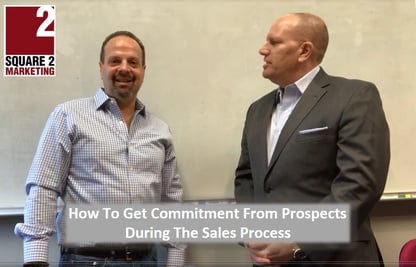Repeatable Sales Execution: The Secret To Closing New Customers Faster
80% Of Lost Deals Are Due To Not Getting Commitments From Prospects In The Sales Process
 In the hyper-competitive world most of us play in, it’s no longer enough to generate leads for your business.
In the hyper-competitive world most of us play in, it’s no longer enough to generate leads for your business.
Today, you must be working to help close those leads and turn those leads into new customers and new revenue. Click the picture to watch the video (2:57) or click here to launch the video.
Even helping out to close leads isn’t enough. You should be working toward creating a scalable, repeatable and predictable revenue generation machine or system that produces new revenue week after week and month over month, so you blow by your revenue goals for the year.
To do that, you’re going to need to be intimate with your company’s sales execution and how you create a unique and highly educational experience for your prospects. Along the way, sales tips need to be architected into the process. One of the best is gaining commitments from your prospects at various strategic places along your sales process.
I chatted with Mark Kesti, chief sales officer and director of the sales enablement practice at Square 2 Marketing, about sales execution and how to make it hum at your company.
Types Of Commitment To Look For
 No, you don’t need marriage-level commitment to be successful in sales. But when you look back over your process, you’ll find many opportunities to improve your ability to gain commitments from prospects.
No, you don’t need marriage-level commitment to be successful in sales. But when you look back over your process, you’ll find many opportunities to improve your ability to gain commitments from prospects.
You can gain commitments around next steps, specifically meetings or conversations required to move the process forward. You also can gain commitments to providing additional information.
Typically, prospects are unprepared with every piece of information you might need to get a solid set of recommendations together. Asking prospects to get you that extra information is a commitment that they should be happy to make and deliver on. If they fail to deliver, it’s an indication this might not be a viable opportunity, or they might not be a good customer. Both give you the ability to end the sales process and spend your time with better opportunities.
Here’s an example: We like to work with as much data as possible when we evaluate a prospect’s current marketing and sales funnel, and then we build them their ultimate sales and marketing funnel. We need website visitors, conversion rates, average revenue, close rates on proposals submitted and a handful of other funnel-related data points. Prospects don’t always have quick access to some of this data, and we ask them to collect it and share it with us, two commitments they make to us. In exchange, our commitment to them is to unveil the funnel they need to hit their revenue goals. It’s a great session, but it needs commitment.
Another type of commitment might be financial. During our sales assessments, we might want to look for underperforming sales reps or an uneven distribution of revenue from the sales team. Typically, 80% of revenue comes from 20% of the reps, and the remaining reps are worth looking at for reduction or training improvements. Clients that don’t want to share this (even though we’ve signed NDAs) might not be great clients. We’re looking for companies that want partners, so the commitments are key.
Asking The Right Questions To Gain Commitment
 Let’s be honest, when you think of the best salespeople you’ve ever met, what skill do they all poses? They ask the best questions at the right time, and they ask questions that truly make prospects think. When you ask great questions, the prospects feel good.
Let’s be honest, when you think of the best salespeople you’ve ever met, what skill do they all poses? They ask the best questions at the right time, and they ask questions that truly make prospects think. When you ask great questions, the prospects feel good.
They see how smart the team is and they get more comfortable. Those questions give prospects a chance to talk about themselves and their businesses. Everyone loves talking about themselves, making them feel even safer and more comfortable.
The best questions often require prospects to collect consensus or information and report back. Sometimes salespeople have to collect additional information for prospects. This activity is common and would not be a flag to make a prospect uncomfortable. Both activities open the door to gain commitment — commitment to collect the missing data, commitment to share those findings and then commitment to get back together to discuss or provide some insights based on that data.
Here is one of my favorite questions: What is your budget for this initiative? Most prospects think we ask that question to figure out what to charge them. That couldn’t be further from the truth. We ask that question to make sure your goals are aligned with your level of investment. We ask that question so we can help prospects create the right budget if it’s out of alignment, or to understand the implications the budget has on their growth goals.
We need a commitment from our prospective clients that they are either willing to increase their budget if their goals are too aggressive or (and this is important) lower their growth goals to match their budget. Either one is fine for us, but expecting to double revenue in three months with $215 a month is not reasonable. We might need a commitment from the prospect to reevaluate their 2018 revenue goals and/or their budget for marketing and sales investments.
By the way, when you don’t share your budget with your prospective marketing or sales consulting partner, it just shows you’re not willing to make a commitment to them. It makes no sense to have them give you recommendations that are out of line with your budget.
Why Commitment Is Important
 Besides the human behavior aspects described below (which are interesting), getting commitment early and often is a key to having a more guided sales process and creating a more advisory relationship with your prospects. You want to make sure they are on board early and often. Continually checking in for commitments and having them then deliver means they’re engaged. If they don’t come through on their end, they’re not going to hire you.
Besides the human behavior aspects described below (which are interesting), getting commitment early and often is a key to having a more guided sales process and creating a more advisory relationship with your prospects. You want to make sure they are on board early and often. Continually checking in for commitments and having them then deliver means they’re engaged. If they don’t come through on their end, they’re not going to hire you.
The process is almost always a window into what working together is going to be like. If prospects are hard to deal with in the sales process, they are going to be harder to deal with as customers. If prospects need a lot of education and hand-holding, they’re going to need that as customers too. If they appear to be unorganized, scatter-brained or easily distracted, well, you know the story. Qualifying prospects in during your process is just as important as qualifying them out. Asking for commitments is a great way to do this.
Gaining Commitment And Neuromarketing
 It’s important to gain even small levels of commitment along the way so that when you need bigger commitments, the prospect is inclined to agree. From the Harvard Business Review, “research has shown that incremental commitments can boost charitable giving, increase show rates for blood drives and reduce smoking.
It’s important to gain even small levels of commitment along the way so that when you need bigger commitments, the prospect is inclined to agree. From the Harvard Business Review, “research has shown that incremental commitments can boost charitable giving, increase show rates for blood drives and reduce smoking.
“In a seminal study, a team posing as volunteer workers canvassed a neighborhood and asked residents to put a large “Drive Carefully” billboard in their front yards. Most residents, over 80%, refused to do so, mostly because the signs would have obstructed the views of their homes. Researchers had better luck in a nearby neighborhood, however, by first asking residents to display a smaller, three-inch sign that read “Be a Safe Driver.” This request was met with almost universal acceptance. Then, two weeks later, when researchers returned and asked this second group of homeowners to put the large “Drive Carefully” billboards in their front yards, 76% agreed to do so.
“An incremental approach to sales has many benefits. It allows reps to glean more information from prospects and to gauge their commitment rather than just their comprehension — a crucial difference in a customer conversation. Usually, reps are taught to listen for phrases from prospects such as “that makes sense” or “that’s a valid point” or nonverbal signals such as head nods. But these cues mean only that a prospect is comprehending what you’re saying. They’re analogous to the conversational si in Spanish and many other languages, which means “I hear you,” not “I agree with you.”
“Commitment, on the other hand, requires action. For instance, if you were to periodically prompt prospects to confirm that they agree with the data or objective you’ve cited, and then ask them if they’d be willing to act on that agreement via some small action, you’d receive much clearer feedback. If the prospect commits, you can move on; if not, you should identify the objection or barrier, and deal with it.
“Because incremental commitments are so vital, you must be intentional in securing them. As a general rule, the earlier you can identify objections, the more likely the sale will occur.”
Gaining commitment along the sales process is just one of many checklist items. The key to scalable and repeatable sales improvement is identifying all of the checklist items and making sure your team is executing them all in the same way every single time. The whole point of a documented and refined sales process is to have all of your salespeople taking the same action at the same time and using the same tools, messaging and approach.
Only then can you identify the parts of the process that are underperforming, apply upgrades and continue to iterate on the process until it produces the scalable and predictable results you need to grow your company.
Square 2 Marketing – Revenue Is Earned With Expertise, Proven Methodology And Insights!

CEO and Chief Revenue Scientist
Mike Lieberman, CEO and Chief Revenue Scientist
Eliminate Hit-or-Miss Marketing Moves
Get advice, tips, tools and guidance to generate more leads for your company in this weekly email newsletter.



Eliminate Hit-or-Miss Marketing Moves
Get advice, tips, tools and guidance to generate more leads for your company in this weekly email newsletter.













